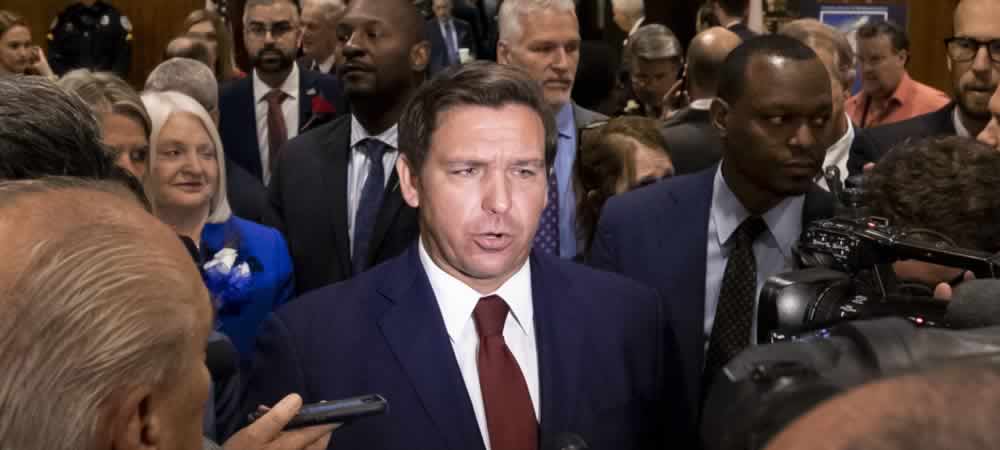- Governor Ron DeSantis has been gauging the stance of each potential sports betting stakeholder in FL.
- Little progress has been made in finding a workable solution for legal sports betting this year.
- The Seminole Tribe of Florida holds all the cards, but they may not play them until next year.
TALLAHASSEE, Fla. – Florida Gov. Ron DeSantis has been making the rounds of late, meeting last Friday with representatives from every corner of the state’s gambling industry to talk shop about sports betting.
While sports betting is not yet formally legalized in Florida, it seems inevitable that it will be. However, the timeline for that is up in the air, as there are still no workable agreements between the Seminole Tribe of Florida, the various racetrack and fronton operators in the state, and other gambling stakeholders.
As in many other states facing sports wagering exclusivity issues, the heart of the matter in Florida boils down to where and how bettors would be able to place their wagers.
The Seminole Tribe claims that they have exclusive rights to offer the pastime per their existing tribal compact. The Tribe is further empowered by virtue of the fact that they’re sitting on a court ruling that the state has violated this same compact in allowing non-tribal pari-mutuel venues to offer card-based gambling.
As a result, the Seminole Tribe can – at its sole discretion – choose to withhold its annual “exclusivity” payments to the state of Florida, which currently amount to over $350 million per year.
That’s a lot more money than any legalized sports betting market could conceivably generate for the state. Per the American Gaming Association (see page 65 of their 2017 report here, Florida would rake in $155.7 million in annual revenue from a mature sports wagering market with convenient availability couple with high tax rates.
This means that the best-case scenario for the state regarding sports wagering income puts it nearly $200 million in the red compared against what the Florida government would earn by simply continuing to honor its Seminole compact.
Does Amendment 3 Preclude Sports Betting?
According to Tallahassee-based lawyer Paul M. Hawkes writing on behalf of the anti-gambling PAC No Casinos In Florida, the recently-passed Amendment 3 would effectively preclude any expansion of Florida gaming without putting it to the public for a vote. This includes sports betting.
Amendment 3 (which is now enumerated as Article X, Section 30 of the Florida Constitution) “ensures that Florida voters shall have the exclusive right to decide whether to authorize casino gambling in the State of Florida.”
The issue, of course, is whether or not sports betting is explicitly considered “casino gaming.”
Given that sports wagering was, until very recently, federally barred from inclusion in the definition of casino gaming in 49 of 50 US states, the legal precedent does not support the new interpretation.
Further, Amendment 3 specifically exempts the Seminole Tribe of Florida’s gaming operations. In fact, the Tribe – via government lobby – spent upwards of $25 million to insert the following language into the amendment:
“[N]othing herein shall be construed to limit the ability of the state or Native American tribes to negotiate gaming compacts pursuant to the Federal Indian Gaming Regulatory Act for the conduct of casino gambling on tribal lands…”
According to Hawkes in his own analysis, the IGRA includes “sports betting” as a Class III casino gaming product. Unfortunately for Hawkes, the full text of the IGRA – while specifically defining all classes of tribal gaming – does not include the word “sports” even a single time, much less the phrase “sports betting.”
A Loophole, If Needed
Despite the Hawkes letter providing no compelling argument to bar sports wagering from being offered at Florida gaming venues, there is a “loophole” that would obviate the requirement altogether.
Florida, as it stands now, actually bars sports wagering by law. As a result, the state could sidestep the need for a referendum by simply repealing those betting prohibitions and then regulating sports wagering as it does all other forms of allowed gaming.
From a legal perspective, the lifting of am extant prohibition is not the same as the authorization of a new product, business, or activity.
This “repeal and replace” tactic is lawfully valid, but it would be a point of controversy and would likely lead to protracted legal challenges.
The Future For Legal Sports Betting In Florida
With just a week to go before the 2019 Florida legislative session adjourns (and with no emergency or special sessions likely this year), there is virtually no chance that sports betting will be legalized this year.
However, with all sides meeting and making their positions clear to the state’s executive and legislative branches, next year could bring significant progress on the matter.
One potential outcome for legal sports betting in Florida is that the Seminole Tribe would be the de facto land-based operator.
Online bettors would have to register their accounts in person at one of the Seminoles’ many casino venues in the state, while commercial venues would have to pay a fee or royalty to the tribe to offer wagering products statewide.
There are other options: Exclusive land-based wagering at tribal venues, a legal decision that Florida sports betting is not part of the Seminole compact, statewide commercial sports betting over the Internet, and so on.
However, it is exceedingly unlikely that the state will cut the Seminole Tribe out of the equation. Again, it all comes down to money, and the Seminoles are the ones dangling the carrot, not the other way around.
Advertising Disclosure
In order to provide you with the best independent sports betting news and content LegalSportsBetting.com may receive a commission from partners when you make a purchase through a link on our site.
News tags: DeSantis | Florida | Florida sports betting | Seminole Tribe | sports betting

Andy has been writing professionally for nearly two decades, with the last three years being dedicated to his primary passions: sports wagering news and gambling industry analyses. A walk-on punter, Andy has a particular interest in professional football, baseball, and horse racing betting. Come early May, you can always catch Andy – clad in all white, mint julep in hand – on Millionaires Row at Churchill Downs. In his dreams.


 College Football Betting
College Football Betting Best Online Sports Betting
Best Online Sports Betting Best Legal NFL Betting
Best Legal NFL Betting States With Legal Sports Betting
States With Legal Sports Betting Sports Betting Events
Sports Betting Events




